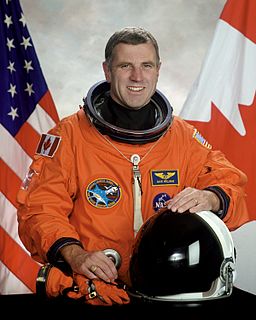A Quote by Rusty Schweickart
Asteroids are deep-space bodies orbiting the Sun, not the Earth, and traveling to one would mean sending humans into solar orbit for the very first time. Facing those challenges of radiation, navigation and life support on a months-long trip millions of miles from home would be a perfect learning journey before a Mars trip.
Related Quotes
By 2025 we expect new spacecraft designed for long journeys to allow us to begin the first ever crewed missions beyond the Moon into deep space. So we'll start by sending astronauts to an asteroid for the first time in history. By the mid-2030s I believe we can send humans to orbit Mars and return them safely to Earth. And a landing on Mars will follow and I expect to be around in see it.
The Fuse is a solar energy station in orbit 22,000 miles above the earth. But it's more than just a big solar panel array. The Fuse is also home to Midway City, a technically illegal settlement that grew out of a bunch of engineers who decided they'd rather make a new life in space than return home to earth.
One of the things that's really exciting from my perspective is that Canada is one of the major spacefaring nations. The list of our achievements is profound and significant, and it's not just in robotics, it's also in the life-sciences research experiments that take place on board and other space-science experiments. I'd love to see Canada go from being a major spacefaring nation in low-Earth-orbit missions to those beyond, making sure we're part of those missions to Mars - not just from a technology perspective, but sending humans into beyond-Earth orbit.
The first men who set out for Mars had better make sure they leave everything at home in apple-pie order. They won't get back to earth for more than two and a half years. The difficulties of a trip to mars are formidable. . . . What curious information will these first explorers carry back from Mars? Nobody knows-and its extremely doubtful that anyone now living will ever know. All that can be said with certainty today is this: the trip will be made, and will be made . . . someday.
If you were to stand on an asteroid in the main belt of asteroids between Mars and Jupiter in our solar system, you might be able to see one or two asteroids in the sky, but they would be very far away and very, very small. So you wouldn't have this 'dodging through tons of rocks' business you get in the movies.
I've spent so much time with my dad traveling and seeing the ground-level change that we've been able to make through philanthropy and trip over trip, time over time, country over country, home after home we've been invited into, given tea, given food that people didn't have to give us, I mean all of these things.
Deep beneath the surface of the Sun, enormous forces were gathering. At any moment, the energies of a million hydrogen bombs might burst forth in the awesome explosion.... Climbing at millions of miles per hour, an invisible fireball many times the size of Earth would leap from the Sun and head out across space.
I would love to see the world's space programs continue toward sending humans to an asteroid or to Mars, with, of course, a full plan in place to bring them back. That excites me. And one of the things that excites me most about space is that we can go up there and put spacecraft in orbit with sensors that will help us measure the health of our planet, which is becoming particularly important. Our planet needs to be observed.
My social life goes in bursts, where I get like, "Oh, I gotta get out and do something, man, I gotta do something." And I'll plan a trip and go on a motorcycle trip down the Baja Peninsula for 900 miles and I'll hang out with my friends for like a month, and then they'll never see me for two months or three months or whatever, and I won't answer any calls.































